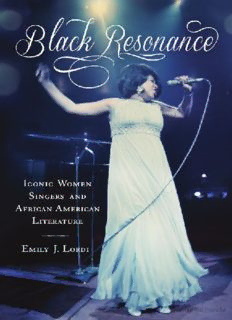
Black Resonance: Iconic Women Singers and African American Literature PDF
Preview Black Resonance: Iconic Women Singers and African American Literature
Black Resonance Black Resonance Iconic Women Singers and African American Literature emily j. lordi Rutgers University Press new brunswick, new jersey, and london library of congress cataloging-in-publication data Lordi, Emily J., 1979– Black resonance : iconic women singers and African American literature / Emily J. Lordi. pages cm. — (American Literatures Initiative) Includes bibliographical references and index. ISBN 978-0-8135-6250-6 (hardcover : alk. paper) ISBN 978-0-8135-6249-0 (pbk. : alk. paper) ISBN 978-0-8135-6251-3 (e-book) 1. American fiction—African American authors—History and criticism. 2. African American women singers—In literature. 3. African American women in literature. 4. Music in literature. I. Title. PS153.N5L68 2013 810.9’896073—dc23 2012051444 A British Cataloging-in-Publication record for this book is available from the British Library. Copyright © 2013 by Emily J. Lordi All rights reserved No part of this book may be reproduced or utilized in any form or by any means, electronic or mechanical, or by any information storage and retrieval system, without written permission from the publisher. Please contact Rutgers University Press, 106 Somerset Street, New Brunswick, NJ 08901. The only exception to this prohibition is “fair use” as defined by U.S. copyright law. Visit our website: http://rutgerspress.rutgers.edu Manufactured in the United States of America A book in the American Literatures Initiative (ALI), a collaborative publishing project of NYU Press, Fordham University Press, Rutgers University Press, Temple University Press, and the University of Virginia Press. The Initiative is supported by The Andrew W. Mellon Foundation. For more information, please visit www.americanliteratures.org. For my parents Contents Acknowledgments ix Introduction: Black Resonance 1 1 Vivid Lyricism: Richard Wright and Bessie Smith’s Blues 27 2 The Timbre of Sincerity: Mahalia Jackson’s Gospel Sound and Ralph Ellison’s Invisible Man 66 3 Understatement: James Baldwin, Bessie Smith, and Billie Holiday 99 4 Haunting: Gayl Jones’s Corregidora and Billie Holiday’s “Strange Fruit” 137 5 Signature Voices: Nikki Giovanni, Aretha Franklin, and the Black Arts Movement 173 Epilogue: “At Last”: Etta James, Poetry, Hip Hop 209 Notes 227 Index 275 Acknowledgments A recent book by Anthony Heilbut quotes Aretha Franklin as saying, “I’m sentimental, I don’t forget.” I know what she means and for that reason have looked forward to writing these acknowledgments for years. I am proud that this project began at Columbia University. Robert G. O’Meally, Farah Jasmine Griffin, Ann Douglas, Brent Hayes Edwards, Robin D. G. Kelley, Marcellus Blount, and Monica Miller not only fos- tered this particular work but also continue to inspire me with their exemplary scholarship, writing, teaching, and style. To have trained with them is to never have to wonder if what we do matters; their political commitments are as clear as they are complex. My debt to Bob O’Meally is happily profound. A mentor in the truest sense of the word, he spent hours in conversation, invited me into intellectual and artistic commu- nities, and essentially made a place for me in this profession long before I warranted one. He is the most generous scholar I know and the best example of Ralph Ellison’s dictum that the secret of the game is to make life swing. Thank you. Several colleagues at Cornell, where I worked as a visiting assistant professor in the English Department from 2009 to 2011, gave me well- timed support and valuable advice. Thanks to Ellis Hanson, Grant Farred, Shirley Samuels, Dagmawi Woubshet, Rayna Kalas, Jeremy Brad- dock, and Margo Crawford. Thanks especially to my students at Cornell, who provided such a rich foundation for my teaching career. Since com- ing to UMass Amherst in 2011, I have been welcomed and supported by too many people to name, but I especially appreciate the guidance of
Description: